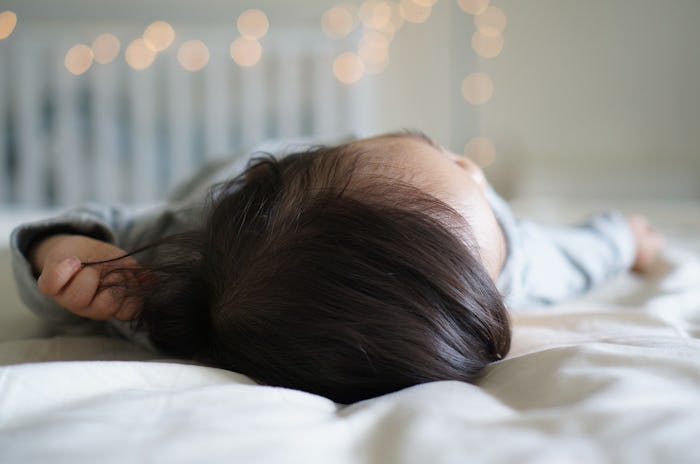Life

Everything You Need To Know About Sleep Training Your 9-Month-Old
They say you should never discuss religion and politics in polite company. If your company includes other moms and dads, go ahead and add sleep training to that list. It’s super controversial among parents, with some who swear by it and some who would never consider it. Me? I vowed to be there for my baby until she figured it out on her own. And then months of sleep deprivation caught up to me. If you can’t remember the last time you felt well-rested, let’s talk about everything you need to about sleep training a 9-month-old— including what some experts say about that age.
I remember once when I was a pregnant, a dad I knew mentioned to me that his baby hadn’t begun sleeping through the night until around six months. I was appalled, especially since he seemed to think that was “early.” Like the naive, childless idiot I was at the time, I thought to myself that he and his wife must have made some terrible mistake. One that I of course would never make, because there was no way I could make it through six months of my life with a baby that didn’t sleep. I was extremely confident that my baby would inherit my love of bedtime and routinely go down for 10 or 12 hours at a time. Like I said, naive childless idiot.
It didn’t happen for us that way, and as much as I didn’t want to do it, in the end sleep training saved my sanity. It wasn’t easy, and there were tears (from both of us), but it was the right choice for my family. If you think it might be right for you and your baby, here are 9 things to keep in mind.
1You Both Need To Be Ready
There's a decent chance that sleep training is a decision you agonized over for a while (I know I did). It's OK to wait until the time is right for both you and your baby. The Baby Sleep Site noted that some ages work better than others for sleep training, and suggested starting between four and seven months of age, or waiting until 11 to 16 months. Why might you want to skip over sleep training from eight to ten months? That's when a sleep regression might hit, and it effects some babies more than others.
2You Might Be Judged
Not everyone agrees with the idea of sleep training. For every article you find talking about how sleep training is safe and effective, you're likely to find another full of criticism. As in all things parenting related, you have to decide what you think is right for your child and yourself and do your best to ignore the judgment.
3There Are Lots Of Different Methods
Sleep training can mean many different things. There are versions that involve no crying, versions that involve camping out in your baby's room, and, of course, versions that involve letting your baby cry it out. Baby Center suggested that finding a method that matches your child's personality may lead to a greater chance of success.
4Having A Routine Can Help
Your baby may do better with sleep training if they can expect that bed time is coming up. Parents noted that sticking to a pre-bed routine like a bath or a book can make things easier.
5They Won't Sleep Unless All Their Needs Are Met
No matter what method of sleep training you choose, your baby is not going to sleep if something is bugging them. During the first couple of night's of sleep training in my house, we had to pause for a diaper change. After my baby girl was comfortable and dry again, getting her back to sleep was much easier.
6It May Get Worse Before It Gets Better
If you've chosen a sleep training method that involves some crying, be warned that your baby may seem to backtrack after a couple of days and cry even more. The Baby Sleep Site noted that the "extinction burst," while frustrating, can actually mean that you're on the right track.
7Consistency Is Key
No method of sleep training is going to be effective if you don't stick with it, even on the hardest night. Baby Center noted that consistency is super important and your baby needs to be able to rely on it.
8You and Your Partner May Need To Tag Team
I'll admit that I was the one who pushed to sleep train my daughter, probably because, as the stay-at-home parent, I was the one who lost the most sleep. But I'm also the one who took it harder when she cried. For the sake of consistency I forced myself to handle as much of the sleep training as possible, but there were times when I needed a break and my husband had to step in.
9It's Going To Be Hard, But Worth It
No one in the world enjoys the sound of a crying baby, and it's never easy for a parent to listen to their child wail. Sleep training is difficult on a lot of different levels, but I personally am so glad I finally did it. I was so scared that my baby was going to be sad and clingy after that first night, but instead, she seemed happier and more playful than normal. Getting a good night's rest was great for her, and for me too.